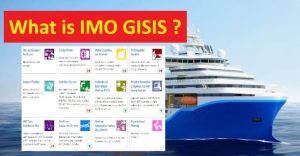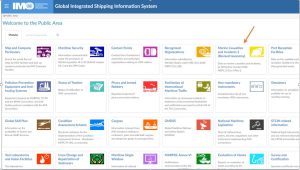Explore the top 7 ways the IMO GISIS platform enhances maritime safety and compliance. Learn how GISIS supports seafarers, regulators, and operators with accurate data and smarter decisions.

Why GISIS Matters in Today’s Maritime Industry ?
In modern shipping, where global operations must align with international safety protocols, fast and accurate access to verified data can mean the difference between a safe voyage and an expensive detention. This is where the Global Integrated Shipping Information System (GISIS), developed by the International Maritime Organization (IMO), plays a crucial role.
Introduced in 2005 and regularly updated since, GISIS has become the go-to maritime safety database used by flag states, port authorities, shipowners, P&I clubs, and maritime students. It brings together real-time and historical data on ship inspections, casualties, port reception facilities, and more.
With safety regulations becoming increasingly strict—such as the 2020 sulphur cap, CII tracking, or the EU ETS emissions scheme—maritime professionals need smarter tools to stay ahead. GISIS is that tool. Let’s explore how it truly supports maritime safety and compliance in 2025 and beyond.
1. Promotes Transparency Through Maritime Casualty Reporting
One of the most important roles of GISIS is to centralize reports of marine casualties and incidents. When accidents occur—whether a grounding, fire, collision, or pollution event—IMO member states submit investigation reports directly to GISIS.
Each report typically includes:
-
A detailed narrative of what happened
-
Time, location, ship type, and flag
-
Consequences for crew, cargo, or the environment
-
Links to safety recommendations
Why it matters:
Maritime companies and regulators can learn from past mistakes. For example, patterns in grounding incidents near the Bosphorus led to route redesigns and stricter pilotage rules.
Real-World Example:
In 2023, a bulk carrier grounding in the South China Sea triggered safety circulars regarding ECDIS over-reliance—shared globally via GISIS and endorsed by The Nautical Institute.
2. Tracks Port State Control (PSC) Inspection Histories
GISIS integrates PSC data submitted by major regional agreements like Paris MoU, Tokyo MoU, and USCG. Users can view:
-
The number of inspections a ship or flag has undergone
-
Reasons for detention (e.g., fire safety violations, MARPOL breaches)
-
Annual performance reports of flag states
-
Inspection trends by ship type or age
Why it matters:
Shipowners and operators can identify high-risk areas, and port states can target substandard vessels more effectively.
Use case:
A superintendent preparing for port entry in Rotterdam may use GISIS to review common detainable items, helping ensure the crew and documentation are ready.
3. Supports Flag State Performance Monitoring
GISIS provides a vital tool for tracking flag state implementation of IMO conventions such as:
-
SOLAS (Safety of Life at Sea)
-
MARPOL (Pollution Prevention)
-
STCW (Training and Certification of Seafarers)
You can access audit results, national contact points, and voluntary self-assessments submitted by member states.
Why it matters:
This feature helps vessel owners choose flags not only based on cost, but based on safety performance and credibility. Flags with frequent audit failures or high detention rates risk reputational harm and potential restrictions.
Stat Insight:
According to GISIS data analyzed by Clarksons Research (2024), ships under poorly performing flags are 3.5 times more likely to face detention in OECD ports.
4. Offers Real-Time Waste Reception Facility Information
Ships must discharge oily waste, garbage, and sewage in MARPOL-compliant ports. GISIS lists Port Reception Facilities (PRFs) globally, including:
-
Waste categories accepted
-
Contact information and hours of operation
-
Reported inadequacies by shipmasters
-
National port waste management strategies
Why it matters:
Incorrect planning around waste discharge can lead to MARPOL violations and heavy fines.
Use case:
A ship navigating the Mediterranean ECA zone uses GISIS to locate a port that accepts sewage and food waste under Annex IV and V before its next voyage.
5. Provides Ballast Water Management Port Information
GISIS is one of the few platforms where ship operators can find:
-
Lists of ports that provide ballast water reception facilities
-
Information about ballast exchange areas
-
National implementation status of the Ballast Water Management (BWM) Convention
Why it matters:
Ballast mismanagement can lead to ecological harm, detentions, or denial of port entry.
Regulatory Insight:
With the BWM Convention fully enforced since 2017, and many countries now prosecuting non-compliance, GISIS data is an essential planning resource.
6. Connects You to Recognized Organizations (ROs) and Classification Societies
GISIS includes detailed information about organizations authorized by flag states to carry out:
-
Vessel surveys
-
Safety inspections
-
Certification tasks
-
Equipment approvals
Each RO entry includes:
-
Recognizing state(s)
-
Scope of authorization
-
Validity dates
-
Past revocations or suspensions (if any)
Why it matters:
For companies considering switching classification societies or engaging surveyors, GISIS acts as an official verification tool.
Supported Entities:
Leading class societies like DNV, Lloyd’s Register, ClassNK, ABS, and RINA are all listed here with current statuses.
7. Enables Better Decision-Making Through IMO Safety Reports and Environmental Data
GISIS serves as the central archive for IMO reports and initiatives tied to safety and environmental compliance, including:
-
Emission compliance (MARPOL Annex VI)
-
CII and SEEMP reports
-
EEDI data
-
National maritime strategies
-
Human element and fatigue studies
Why it matters:
This content helps shape internal Safety Management Systems (SMS), bridge training programs, and ESG strategy.
Example:
In 2025, many ship managers are using GISIS for benchmarking CII ratings across similar vessel types before making retrofit investments.
Case Study: How GISIS Helped a Manager Avoid a Compliance Penalty
In 2024, a tanker operator received a PSC warning in Port Said for failing to declare its waste discharge plan. The DPA quickly accessed GISIS to confirm the port’s PRF limitations and submitted evidence to the inspector, avoiding a MARPOL fine.
Later, the company integrated GISIS modules into its ship-shore digital platform, improving voyage planning and inspection readiness across the fleet.
Frequently Asked Questions (FAQ)
Is GISIS free for public users?
Yes. Many modules are open to the public. More advanced features may require free registration and role-based access.
Can seafarers use GISIS for career or study purposes?
Definitely. Many maritime academies recommend GISIS for understanding safety trends, regulatory performance, and case studies.
How does GISIS support ESG and decarbonization goals?
By sharing data on emissions, energy efficiency, waste reception, and national plans, GISIS allows transparency in sustainability efforts.
How often is GISIS updated?
Continuously. Updates depend on submissions from flag states and recognized authorities. Some modules update monthly, others weekly.
Can I download data from GISIS?
Yes, many sections allow data export in PDF or Excel format for internal analysis.
Conclusion
IMO GISIS is much more than a digital archive—it’s a live, evolving platform that empowers global maritime safety, fosters transparency, and helps companies meet their compliance obligations in a changing world.
By exploring GISIS’ advantages—from flag state reports to casualty analysis and waste facility databases—shipowners, crew managers, port officials, and educators gain an essential tool in the quest for smarter, safer, and more sustainable shipping.
The more informed the industry, the safer the sea—and GISIS helps bridge that gap.
References
-
International Maritime Organization (IMO). Global Integrated Shipping Information System (GISIS). https://gisis.imo.org
-
Clarksons Research. (2024). Flag State Safety Performance Trends. https://www.clarksons.net
-
Paris MoU. Annual PSC Inspection Reports. https://www.parismou.org
-
The Nautical Institute. Casualty Investigation Best Practices. https://www.nautinst.org
-
UNCTAD. (2024). Review of Maritime Transport. https://unctad.org
-
MarineTraffic. Vessel Movement and Port Analysis Tools. https://www.marinetraffic.com
-
Equasis. Recognized Organization Data Access. https://www.equasis.org
-
Lloyd’s Register. Class Rules and Authorization Status. https://www.lr.org


